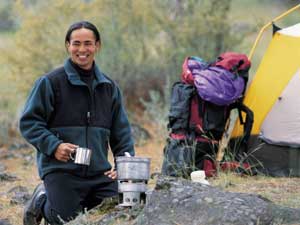 When Camping . . .
When Camping . . .
- Avoid camping alone in isolated areas.
- Park your vehicle so it cannot be blocked by another vehicle in case of emergency.
- Familiarize yourself with local emergency locations and phone numbers in case of accidents or crime.
- Avoid leaving your camping gear (cook stove, lantern, ice chest, chairs, etc.) out in the open unattended.
- Avoid walking alone at night.
- Get to know your camping neighbors and help protect each other's belongings.
- Carry a spare lock so you can use storage containers available at many parks.
- Use a chain and lock to secure propane tanks, extra fuel tanks, portable generators, spare tires, bicycles, etc.
- Always lock your camping trailer when you leave the vicinity.
- Install a locking device on the trailer towing hitch, so your trailer cannot be towed away.
- Before taking weapons with you, be aware of the regulations. In many parks and wildlife refuges, it is against the law to carry weapons.
- Report any suspicious activities and all crimes to the proper authorities—in parks, the park rangers; on private land, the sheriff or police.
When Boating . . .
- Never overload your boat beyond recommend capacity.
- Never leave your keys aboard—even in a "hidden" place.
- Always moor your boat with a chain or cable. Use a good lock and secure the cable/chain around something that cannot be moved or that will not allow the cable/chain to be lifted over it or torn loose.
- Secure outboard motors with special transom bolts or clamping screw locks.
- Consider leaving your engine out of commission when you are away — remove the rotor; install a hidden cut-off switch; drain the fuel; remove a spark plug or the propeller.
- Before leaving your boat moored, secure all removable items. never leave fishing equipment unattended.
Vehicle Security
If it is not possible to park your vehicle within eyesight of your group, leave it some place where it can be watched by park patrols or someone you know; or arrange for someone to drop you off and pick you up later. Other prevention techniques are:
- If you must leave valuables in your vehicle, place them in the trunk—not under the front seat or hidden under clothing. (Be cautious that you are not being observed when putting valuables in your trunk.)
- Install a locking hood latch.
- Install an alarm device in your vehicle which will activate a siren, horn or lights to frighten thieves away.
- Equip your vehicle with locking lug nuts to prevent your wheels from being stolen.
- Install a battery locking device to prevent the battery from being stolen.
Mark Your Property
Like your TV, VCR, stereo and other belongings at home, camping equipment is also vulnerable to theft, especially when left in the open. Mark all your belongings with your California driver license number and keep a record of equipment.
- Mark your tent, sleeping bags and clothing with indelible ink.
- Engrave your food locker, thermos, coolers, lamps and flashlights—and don't forget fishing poles, tackle boxes, backpacks, barbecue grills, snorkels and fins.
Safety Precautions
- Be sure everyone in your party is aware of park/campground rules and regulations.
- When hiking, backpacking or cross-country skiing, notify the ranger or campground host of your plans, including the trails you are taking, the expected time of your return and the name of a friend or relative to be notified in case of emergency.
- Consider having everyone carry a whistle to use in case of an emergency.
- Never let children wander off by themselves or leave them unattended near a body of water.
- If you are being annoyed by a discourteous person(s), report the person(s) to the police or park ranger.
You Can Help!
Remember, parks and wilderness areas are for everyone's use and enjoyment. Be sure to pick up your litter and extinguish all fires, so that we can preserve the natural beauty of our parks. Report any acts of vandalism and any suspicious activity you witness to park rangers.